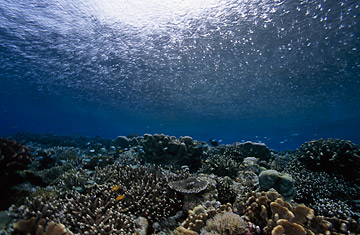
Work in environmental journalism for very long, and you can eventually become inured to catastrophe. Every ecosystem is on the brink of collapse; every endangered species is just a few steps from extinction; every government decision to authorize an oil well or a coal mine is the one that will push carbon emissions over the edge. The language of environmentalism is the language of scarcity and loss, a constantly repeated message that we cannot continue living the way we are, or else. Sometimes the sheer, relentless doomsaying is enough to make you want to take a long, air-conditioned drive in a nice SUV.
But while news of Earth's impending doom can sometimes seem exaggerated, there's one environmental disaster that never gets the coverage it really deserves: the state of the oceans. Most people know that wild fisheries are dwindling, and we might know that low-oxygen aquatic dead zones are blooming around the planet's most crowded coasts. But the oceans appear to be undergoing fundamental changes — many of them for the worse — that we can barely understand, in part because we barely understand that vast blue territory that covers 70% of the globe.
That's the conclusion of a surprising new report issued by the International Programme on the State of the Ocean (IPSO), a global panel of marine experts that met this year at Oxford University to examine the latest science on ocean health. That health, they found, is not good. According to the authors, we are "at high risk for entering a phase of extinction of marine species unprecedented in human history." It's not just about overfishing or marine pollution or even climate change. It's all of those destructive factors working cumulatively and occurring much more rapidly than scientists had expected. "The findings are shocking," says Alex Rogers, the scientific director of IPSO. "We are looking at consequences for humankind that will impact in our lifetime, and worse, our children's and generations beyond that."
What's particularly scary is that while we can be sure we're changing the oceans, it's not so easy to measure the extent of the damage or predict how it will unfold, simply because observations are harder to make underwater than they are on land. (Human beings have explored just 5% of the total volume of the oceans so far.) It's not just a matter of taking bluefin tuna and other valuable species out of the oceans through industrial fishing. The more worrying changes are happening on a chemical level. The oceans have already absorbed more than 80% of the additional heat added to the climate system and about 33% of the carbon dioxide we've emitted into the atmosphere. That's slowed down climate change on land, but it's changing the pH levels of the water in ways that could have a bigger impact on sea life than a thousand factory-fishing boats.
Why is the rate of carbon being absorbed by the oceans so disturbing for marine scientists? Let's put it this way: the rate of carbon absorption right now is far greater than the rate seen some 55 million years ago. That was when the last globally significant extinction of marine species took place, when 50% of some groups of deep-sea animals were wiped out. We can try to restrict fishing, and we can work to protect sensitive coral reefs and other habitats for marine life. But if we can't figure out a way to curb global carbon emissions, we may alter the oceans beyond their ability to heal themselves — at least in ways that will support marine life as we know it.
Despite the scary IPSO reports — and scores of others like it that have been published in the past — the oceans seem likely to continue to get less attention than they need and deserve. Maybe that's because we're fundamentally land-based creatures. Anyone can see a clear-cut rain forest and know that something was lost, but on the surface, a living sea and a dead one look much the same. We used to think the oceans were far too vast for mere humans to affect — but we should know that's not the case any longer. Earth is often tougher than we think, but if we don't do something, we really do risk irrevocably altering the blue in our blue planet.
